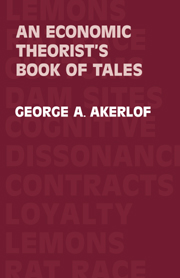Book contents
- Frontmatter
- Contents
- Acknowledgments
- 1 Introduction
- 2 The market for “lemons”: quality uncertainty and the market mechanism
- 3 The economics of caste and of the rat race and other woeful tales
- 4 The economics of “tagging” as applied to the optimal income tax, welfare programs, and manpower planning
- 5 A theory of social custom, of which unemployment may be one consequence
- 6 Jobs as dam sites
- 7 The economic consequences of cognitive dissonance with William T. Dickens
- 8 Labor contracts as partial gift exchange
- 9 Loyalty filters
- Index
7 - The economic consequences of cognitive dissonance with William T. Dickens
Published online by Cambridge University Press: 18 December 2009
- Frontmatter
- Contents
- Acknowledgments
- 1 Introduction
- 2 The market for “lemons”: quality uncertainty and the market mechanism
- 3 The economics of caste and of the rat race and other woeful tales
- 4 The economics of “tagging” as applied to the optimal income tax, welfare programs, and manpower planning
- 5 A theory of social custom, of which unemployment may be one consequence
- 6 Jobs as dam sites
- 7 The economic consequences of cognitive dissonance with William T. Dickens
- 8 Labor contracts as partial gift exchange
- 9 Loyalty filters
- Index
Summary
Since the publication of The Wealth of Nations, economists have built an entire profession on a single powerful theory of human behavior based on a few simple assumptions. That model has been fruitfully applied to a wide range of problems.
But, while economists have been elaborating their analysis, keeping their basic behavioral assumptions the same, sociologists, anthropologists, political scientists, and psychologists have been developing and validating models based on very different assumptions.
For most types of economic behavior, the economists' model is probably quite adequate. The models developed by other social scientists are generally ill-suited for direct incorporation into economic analysis. Nevertheless, insofar as studies in these other disciplines establish that people do not behave as economists assume they do, economics should endeavor to incorporate these observations.
This paper presents an example of how this might be accomplished in one special case. Psychologists have devoted considerable attention to the theory of cognitive dissonance. This theory has been used earlier by Albert Hirschman (1965) to describe attitude changes toward modernization in the course of development. Our paper expands the economic applications of cognitive dissonance and analyzes its welfare consequences in a formal model.
An overview
The basic premises
To begin, we must translate the psychological theory into concepts amenable to incorporation into an economic model. We think the theory of cognitive dissonance can be fairly represented in economists' terms in three propositions: First, persons not only have preferences over states of the world, but also over their beliefs about the state of the world.
- Type
- Chapter
- Information
- An Economic Theorist's Book of Tales , pp. 123 - 144Publisher: Cambridge University PressPrint publication year: 1984



